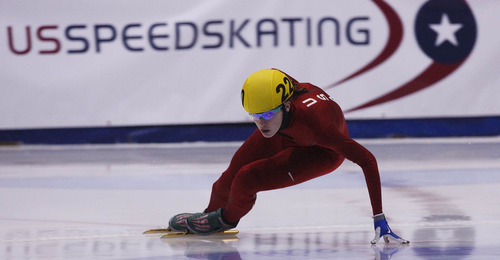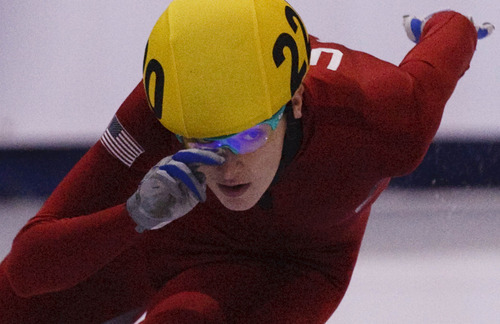This is an archived article that was published on sltrib.com in 2011, and information in the article may be outdated. It is provided only for personal research purposes and may not be reprinted.
Kearns • It has been almost a year since short-track speedskater Katherine Reutter started suffering from an agonizing back injury that ultimately sabotaged her attempt to win the overall world championship in the spring, and only now is she starting to feel like herself again.
All it took was months of visiting nearly two dozen doctors from coast to coast, trying to make sense of a wide variety of opinions and diagnoses … and a thin little foam pad cut out in the shape of her foot and inserted into her skate.
"So small," she marveled. "But it can make such a huge difference."
To be clear, the silver and bronze medalist from the 2010 Vancouver Olympics who lives and trains in Salt Lake City will not be at full strength when she competes at the first short-track World Cup of the new season at the Utah Olympic Oval this weekend.
Not even close.
But after months of trying to get a handle on what was causing the debilitating back spasms that ruined her shot at the overall world title, Reutter finally has been able to return in recent weeks to some semblance of a regular training program, without all the pain.
"So far so good, and I'm just riding that wave, trying to stay healthy through the weekend," she said.
Given her pedigree, Reutter still will be one of the top attractions at the World Cup races, along with fellow Americans J.R. Celski and Jordan Malone, two other Olympic medalists who will be competing for the first time since Vancouver.
Both took last season off to pursue other interests — Celski a documentary film about hip-hop musicians and Malone an academic degree in engineering.
"I wasn't sure if I wanted commit" to the 2014 Sochi Games in Russia, Celski said. "But towards the end of the year [off], I developed sort of a second love for the sport that I hadn't felt before. I want to be the best that I can be in this sport, and I have very limited time to do so."
To some extent, Reutter felt the same way.
The 23-year-old Illinois native had always dreamed of measuring up to local speedskating heroes Cathy Turner and Bonnie Blair, and did not want to lose the momentum she generated from winning silver and bronze medals in Vancouver.
"I wanted to come straight back after the Olympics, put myself in that top spot, so that the whole next four years, every other country is going to come to a World Cup thinking how can they get there?" she said. "I wanted that top spot immediately and I didn't want to lose any momentum getting there."
Along the way, though, came that back injury.
It first bothered her in December, far too close to the world championships for her to consider taking time off to heal. She trained through the pain, and became the first American since Bonnie Blair to win gold at the world championships when she won the women's 1,500 meters in Sheffield, England.
Reutter also finished third in the 1,000 and sixth in the 500, and was poised to win the overall title if she could win the final event, the 3,000.
But her back injury flared shortly before the race. It hurt so bad, she said, that coaches had to tie her skates, and she finished second behind South Korea's Cho Ha-Ri, falling to second in the overall standings.
"Still, honestly, I couldn't tell you what it is" that caused the pain, she said.
That, after traveling to see some of the best doctors across the country — she estimates see saw 18 to 20 doctors, including hip, back and internal medicine specialists — and spending weeks with medical staff at the U.S. Olympic Training Center in Colorado Springs.
Nobody seemed able to give her a definitive diagnosis, or even many that were similar.
"They all had different opinions," coach Jae-Su Chun said, "It was almost end of the world."
Until Chun did something about the 3-millimeter discrepancy in the length of Reutter's legs that they had discovered along the way. The coach bought a small piece of foam, cut it into the shape of Reutter's foot, and put it into her left skate to even out the length of her legs.
"It's made a phenomenal difference," Reutter said.
It's not perfect, of course, and nobody's quite sure how or why it's working.
But things are much better now, and Reutter can train harder and more frequently, without the same reactive fear she developed after her misery at the world championships. Chun believes that even at 75 percent, Reutter has a change to perform well this weekend, because she's simply stronger than many other skaters.
"A lot of those spasms came with a lot of fear, just remembering that moment," Reutter said. "The more that I work … the more I'm able to say, 'OK, that hurt, let's move on,' and it doesn't hold me back mentally or physically the way it used to."
"I still feeling like I'm climbing that ladder," she added. "I don't want to be an underdog at the next Olympics." —
World Cup short-track speedskating
P At Utah Olympic Oval, Kearns
Friday • Qualifying all distances, 10 a.m. to 6 p.m.
Saturday • Men's and women's 1,000 and 1,500 finals, 6 to 9 p.m.
Sunday • Men's and women's 500, 1,500 and relay finals, 3 to 5:30 p.m.





